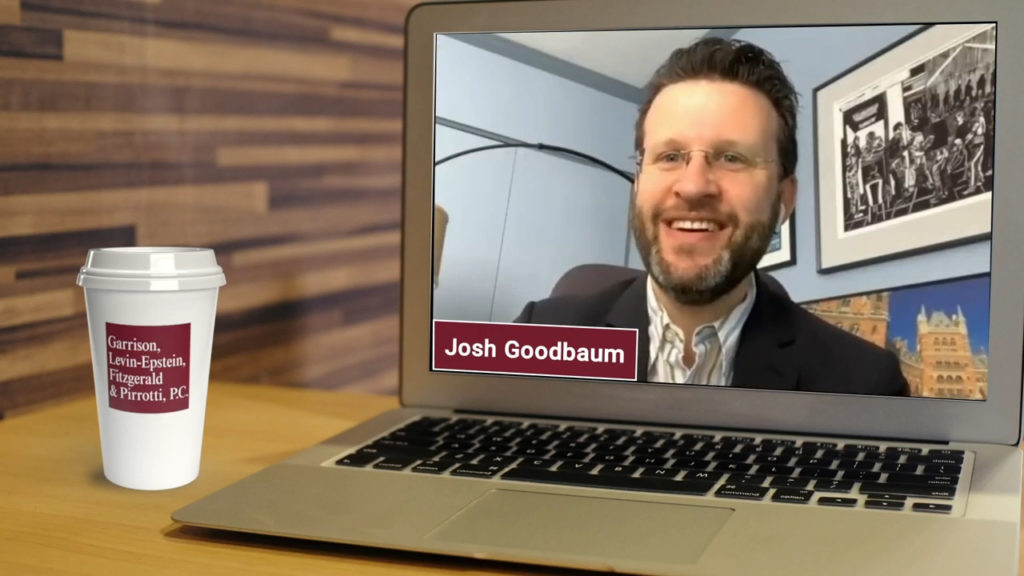Amanda DeMatteis: Hi, Josh.
Josh Goodbaum: Hi, Amanda. What are we talking about today?
DeMatteis: Today we’re going to talk about non-compete agreements. Really typical scenario that I see a lot and I’m sure you do too is a potential client comes in to see me and they’ve signed a non-compete with a previous employer. They’re now working at a subsequent job, really happy, things are going great, and then they receive a cease-and-desist letter from a law firm that’s representing their prior employer. And they’re quite reasonably freaking out over it. They don’t typically receive this type of correspondence from a law firm, and they don’t know what to do. And then, they show up in my office and say, “Help me.” Let’s chat with the employees in Connecticut and let them know what to do when this happens.
Goodbaum: Yeah, I do a lot of this non-compete defense representing Connecticut employees who are concerned about the enforcement of non-competes. So, first step: Take a breath. You’re not the first person to get a letter like this. Nobody is going to jail about this. Nobody is going to die. This is going to be okay. This letter, quite frankly, may just be a scare tactic and your former employer is not really interested in taking it any further; they just want to sort of put you on notice. Alright. At that point, nothing has happened.
But let’s say you didn’t just get a cease-and-desist letter, but you got served with a lawsuit. Now you’re a defendant in a lawsuit and, for a lot of people, that’s their first ever lawsuit and they’re really uncomfortable. The good news to start off with is not every non-compete agreement is enforceable. This is a question of state law. In Connecticut, non-competes are sometimes enforceable and sometimes not. And other states have other rules. Massachusetts, for example, has a statute about non-competes. California basically does not enforce non-competes. But here in Connecticut the rule is your non-compete is enforceable to the extent that it’s reasonable, which, of course, sort of begs the question of what does that mean.
In Connecticut, the courts use a five-factor analysis to consider if a non-compete is enforceable. The five factors are: the geographical scope of the non-compete, the temporal scope of the non-compete – so, how many miles is it and how long does it last – the legitimate business interest of the employer, the employee’s ability to earn a living, and the public interest (whatever exactly that means). All of them are a bit nebulous, but if the non-compete is unreasonable in any of those five factors, then it is unenforceable as a matter of law. The problem here for employees – and frankly for employers too – is that there aren’t any hard and fast rules. Nobody really knows exactly how many miles is reasonable or unreasonable; nobody really knows exactly how many months or years is reasonable or unreasonable. It’s sort of like that famous Supreme Court quote about pornography: “you know it when you see it.” And so if you do enough of this non-compete work, you sort of get a sense, but for the average person, the average Connecticut worker, who’s getting a cease-and-desist letter or lawsuit, they’re really not in a position to evaluate the merits of that, and unfortunately that means they need to go talk to a lawyer like us, and I wish that wasn’t the case.
One of the things that we’ve done at Garrison, Levin-Epstein is to support legislation that would provide some clearer guidance for both employers and employees on the issue of non-competes. A couple of bills were considered by the Connecticut General Assembly this session, but they unfortunately didn’t make it through the committee process. So, if a non-compete is something you’re worried about in the short term, one thing you can do is just talk to a lawyer about your non-compete and figure out if it’s actually going to be enforceable. But another thing that you can do and may frankly make a difference is consider giving your legislator a call. Call your member – your representative or your state senator – and say, “Hey, I’ve got a non-compete, and I’m concerned about it. This is a priority for me as your constituent, and I really hope you will take some action in future sessions to make sure we have some more predictability here.”
Non-competes are a tool that a lot of companies are using not just against or with respect to their senior executives, but Jimmy John’s famously had a non-compete with so-called sandwich artists. That’s ridiculous, right? Nobody earning close to the minimum wage should be prohibited from taking any job they can get to improve their situation. States like Massachusetts have taken that lesson to heart, and I think Connecticut is hopefully on the cusp of doing so.
So hopefully that provides some information for people who are facing a non-compete or thinking about it. If you have any more questions about it, feel free to reach out to us or another Connecticut employment lawyer who can help you think about your situation.
DeMatteis: This is great advice. Thank you so much. And remember this is Connecticut law so whether you are in New Haven, Hartford, Litchfield, Stamford, it doesn’t matter; it’s all the same law that applies to you. Thanks so much for watching and we’ll see you next time.
Goodbaum: Thank you!

